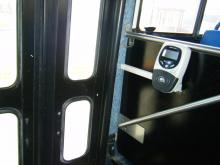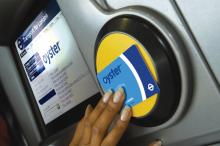Dutch digital security provider Gemalto is to provide South Africa’s Standard Bank with a multifunction contactless payment card enabling users to pay for transit fares and other goods and services with one digital wallet. Standard Bank customers can now use the new MasterCard debit card to wave and pay at the gates in the public transport stations, without needing to carry cash or a separate travel card. The bank says the "Muvo" card initiative will help cardholders gain greater convenience while at the s
Dutch digital security provider 3866 Gemalto is to provide South Africa’s Standard Bank with a multifunction contactless payment card enabling users to pay for transit fares and other goods and services with one digital wallet. Standard Bank customers can now use the new MasterCard debit card to wave and pay at the gates in the public transport stations, without needing to carry cash or a separate travel card. The bank says the "Muvo" card initiative will help cardholders gain greater convenience while at the same time provide competitive advantages to Standard Bank and reduce the burden of managing cash on public transportation in the city of Durban.
The partnership has already resulted in the provision of 100,000 cards for the Ethekwini Municipality, which is looking to dramatically improve ticketless payments for its public transport system in the coastal city of Durban. Commuters can load funds into their cards at around 30 sales points throughout the city. The card complies with the exacting requirements of the National Department of Transport (NDoT) for payment and transport to be combined in one single application. It can also be customised to reflect the profile of individual public transport users, enabling NDoT to adapt its fares accordingly.
"The new card showcases the innovative value we strive to offer our customers by integrating the transit ticket inside a banking card - secured with bank-strength security - along with a payment wallet,” commented Mike Hughes, business development manager of beyond payments, Standard Bank’s innovation and new business division. "We are looking to extend contactless payments to a number of different market sectors including events, schools and university campuses, as well as toll roads and other players in the transport sector”.
"This is a new era of card convergence with multiple services increasingly being combined on a single product that maximises convenience for the end user," added Gabrielle Bugat, senior vice president at Gemalto. "We’ll work with Standard Bank in making financial services more accessible to the underserved population by using transport as a stepping stone.”
The partnership has already resulted in the provision of 100,000 cards for the Ethekwini Municipality, which is looking to dramatically improve ticketless payments for its public transport system in the coastal city of Durban. Commuters can load funds into their cards at around 30 sales points throughout the city. The card complies with the exacting requirements of the National Department of Transport (NDoT) for payment and transport to be combined in one single application. It can also be customised to reflect the profile of individual public transport users, enabling NDoT to adapt its fares accordingly.
"The new card showcases the innovative value we strive to offer our customers by integrating the transit ticket inside a banking card - secured with bank-strength security - along with a payment wallet,” commented Mike Hughes, business development manager of beyond payments, Standard Bank’s innovation and new business division. "We are looking to extend contactless payments to a number of different market sectors including events, schools and university campuses, as well as toll roads and other players in the transport sector”.
"This is a new era of card convergence with multiple services increasingly being combined on a single product that maximises convenience for the end user," added Gabrielle Bugat, senior vice president at Gemalto. "We’ll work with Standard Bank in making financial services more accessible to the underserved population by using transport as a stepping stone.”









